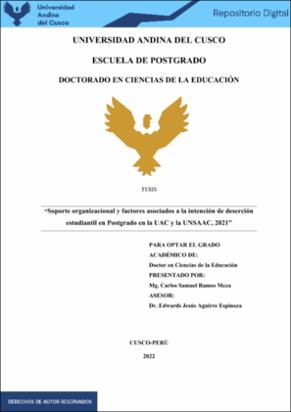| dc.contributor.advisor | Aguirre Espinoza, Edwards Jesús | |
| dc.contributor.author | Ramos Meza, Carlos Samuel | |
| dc.date.accessioned | 2022-07-11T17:59:53Z | |
| dc.date.available | 2022-07-11T17:59:53Z | |
| dc.date.issued | 2022-03-30 | |
| dc.identifier.uri | https://hdl.handle.net/20.500.12557/4749 | |
| dc.description.abstract | Existen pocos estudios empíricos sobre las decisiones de los estudiantes de postgrado que
intentan abandonar sus programas académicos y esto acarrea problemas tanto para ellos
como para las instituciones y sociedad. El objetivo de investigación fue analizar la influencia
del soporte organizacional sobre los factores asociados a la intención de deserción estudiantil
en postgrado en la UAC y en la UNSAAC, 2021. En el presente estudio cuantitativo se
realizó un modelo de ecuaciones estructurales para poder hallar las cargas de regresiones
entre las variables motivo de investigación y medir el efecto moderador. Los hallazgos
indican como factores asociados a la deserción estudiantil al apoyo económico dentro de la
familia como el mayor indicador socioeconómico con un peso de regresión estandarizado de
0.740; la alta exigencia en evaluaciones como el indicador académico con 0.814; los hábitos
de estudios como el indicador personal con 0.615 y la competencia de la plana docente, como
el indicador institucional con 0.734, siendo el principal factor asociado a la intención de
deserción el factor personal, mientras que el indicador del soporte organizacional que
presentó mayor peso de regresión fue la consideración por parte de las instituciones hacia
sus estudiantes con 0.822. Respecto a las medidas absolutas de ajuste, el valor encontrado
fue de 4.816, con un p-valor < 0.000, y el índice ajustado normado dio un valor de 0.548. Si
bien es cierto los índices de ajuste empleados en el modelo de ecuaciones estructurales
satisfacen medianamente los requerimientos de los datos recolectados, permiten sin embargo
tener una muestra clara de cómo estos factores pueden incidir en la deserción estudiantil. | es_PE |
| dc.description.abstract | There are few empirical studies on the decisions of postgraduate students who try to drop
out of their academic programs, which causes problems for them and institutions, and
society. The research objective was to analyze the influence of organizational support on the
factors associated with the intention of student dropout in postgraduate studies at the UAC
and UNSAAC, 2021. In this quantitative study, a model of structural equations was carried
out to find loads of regressions between the variables under investigation and measure the
moderating effect. The findings indicate as factors associated with student dropout economic
support within the family as the most significant socioeconomic indicator with a
standardized regression weight of 0.740; the high demand in evaluations such as the
academic indicator with 0.814; study habits as the personal indicator with 0.615 and the
competence of the teaching staff, as the institutional indicator with 0.734, the main factor
associated with dropping out is the personal factor. In contrast, the organizational support
indicator presented a greater weight of regression was the consideration by the institutions
towards their students with 0.822. Regarding the absolute measures of fit, the value found
was 4.816, with a p-value <0.000, and the normed adjusted index gave a value of 0.548.
Although it is true that the adjustment indices used in the structural equation model
moderately satisfy the requirements of the data collected, they nevertheless allow a clear
sample of how these factors can affect student dropout. | en_US |
| dc.format | application/pdf | es_PE |
| dc.language.iso | spa | es_PE |
| dc.publisher | Universidad Andina del Cusco | es_PE |
| dc.rights | info:eu-repo/semantics/restrictedAccess | es_PE |
| dc.rights.uri | https://creativecommons.org/licenses/by-nc-nd/4.0/ | es_PE |
| dc.subject | Deserción estudiantil | es_PE |
| dc.subject | Factor socioeconómico | es_PE |
| dc.subject | Hábitos de estudio | es_PE |
| dc.title | Soporte organizacional y factores asociados a la intención de deserción estudiantil en Postgrado en la UAC y la UNSAAC, 2021 | es_PE |
| dc.type | info:eu-repo/semantics/doctoralThesis | es_PE |
| thesis.degree.name | Doctor en Ciencias de la Educación | es_PE |
| thesis.degree.grantor | Universidad Andina del Cusco. Escuela de Pos Grado | es_PE |
| thesis.degree.discipline | Ciencias de la Educación | es_PE |
| dc.publisher.country | PE | es_PE |
| dc.subject.ocde | https://purl.org/pe-repo/ocde/ford#5.03.00 | es_PE |
| renati.advisor.dni | 23854868 | |
| renati.advisor.orcid | https://orcid.org/0000-0002-5514-6707 | es_PE |
| renati.author.dni | 42760429 | |
| renati.discipline | 199018 | es_PE |
| renati.juror | Melendrez Velasco, Elias | |
| renati.juror | De La Torre Dueñas, Cleto | |
| renati.juror | Luksic Gibaja, Paula Patricia | |
| renati.juror | Quispe Berrios, Haydee | |
| renati.level | https://purl.org/pe-repo/renati/level#doctor | es_PE |
| renati.type | https://purl.org/pe-repo/renati/type#tesis | es_PE |



